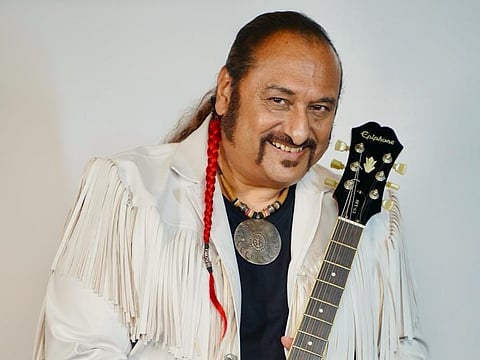Leslee Lewis, one of the pioneers from the world of music, is back with a new track, ‘Meheki Khushboo’
At a certain time in the Indian music industry, there were only two prominent genres—Bollywood, and classical. If the singers would not want to make a career in classical music, Bollywood was the only other option. Very few musicians made a new path straying away from these two genres, but Leslee Lewis is one.
From Coke Studio and Colonial Cousins to advertisement jingles and of course, Bollywood music, this man has done it all. And now, he is back with a new song, heavy on rock influences—made specially for the younger generation.
Excerpts form our conversation with Leslee Lewis:
Please tell us about Meheki Khushboo and the inspiration and rock influences behind it.
I’ve done music for everyone but never really for Leslee, the artist. Meheki Khushboo is my personal expression, raw and inspired by the 70s rock I grew up with. It’s not imitation—it’s my gharana. The song is a clutter-breaker: raw, unfiltered, melodic, and deeply personal. I wrote the lyrics myself, and it comes with the authenticity of the writer’s voice. Today, you hear all the sound is so polished and it’s lacking soul as well as melody, but this is unlike that—it cuts the clutter. And the way I’m singing it, there’s nobody who sings like me. I’ve got my own identity, I’ve written all the lyrics myself, so I know what I want to tell the people.
I created iconic music in the 90s for the generation—indie pop, Bollywood remixes, Coke Studio. But now, I want to create for this generation. I may be the same person, but what I’m bringing now is completely fresh and out-of-the-box. I want this generation to own their music. I’m not trying to copy rock, I have lived it. I know what the vibe was, and that’s what I want to bring to this generation.
What were the lyrical inspirations?
It’s about a moment many people experience but don’t talk about—two strangers connecting at a club, bonding over music, and sharing a night that turns into a memory. It’s emotional and captures something real and unspoken in many urban settings. The next day, all that's left is a memory. I wanted to give voice to that unnamed feeling.
Did making music for commercial purposes—like ads or Bollywood—change how you approach indie music?
Yes, the approach is completely different. When you're making music for a commercial, your job is to sell a product. It's not art, it's messaging—and it has to land in 30 seconds. I understood the client’s needs, crafted music that fit the brand, and appealed to their target audience. It’s a skill, and I’m proud of it. Bollywood too has its own boundaries—you’re working with a visual narrative, a storyline. You serve that. But indie music, that’s a different beast. That’s me—no brief, no client, no director—just emotion and storytelling, from the heart. When I create for myself as an indie artist, I’m not trying to sell anything except my truth.
How did you handle creative burnout, especially during the busiest years of your career?
Honestly, I had to rewire my life. There was a point where I was writing two to three jingles every single day, for years. I hit a wall. I felt like I was burning out artistically and physically, so I made a radical decision: I would only work on Mondays, Wednesdays, and Fridays. It meant cutting back on a huge chunk of income, but I stuck to it.
Tuesdays and Thursdays became my personal days: I went fishing, travelled, and lived life. And you know what? I didn’t fall off the map. I was still getting booked consistently, and the quality of my work improved. That break from the grind gave me the clarity and energy to create projects like Colonial Cousins. If I hadn’t made that change, I probably would’ve fizzled out. I believe that to avoid burnout, you need to protect your creative space—even if it means breaking norms and expectations.
Your father was a choreographer in Bollywood. Did that upbringing influence your music in any way?
Absolutely! My father was from a classical dance background, and that world is inseparable from classical music. As a kid, I was constantly surrounded by musical legends— Laxmikant-Pyarelal, RD Burman, Kalyanji-Anandji, Ustad Alla Rakha, Sitara Devi, Zakir Hussain. I lived between dance rehearsals and recording sessions, absorbing everything. My mother was equally influential—she was a radio addict. So our home was filled with all kinds of music, especially old Bollywood songs. I didn’t always know who sang them or composed them, but I was moved by what I heard. That’s why my sense of melody is so instinctive.
You’ve worked with so many artists. What’s been your most interesting collaboration?
Colonial Cousins, without a doubt. It wasn’t just a collaboration—it was an innovation. Also, people think I collaborated with KK, but I actually introduced him. I created artists. Back then, we had distinct roles—lyricist, composer, singer. Today’s collabs are different, more collective.
Has the age of social media changed how you approach music?
Yes—and I am the change. Music has become about numbers, not quality. But music isn’t dead. I’m using social media to give people real content. Today, artists focus on views instead of value. I want to change that—one raw, authentic song at a time.

